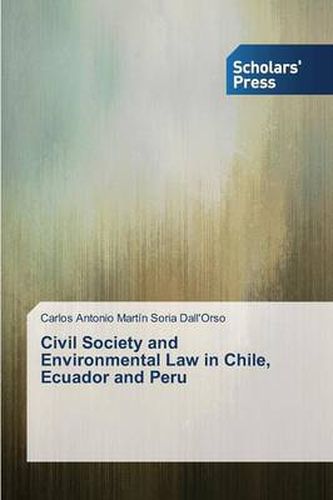Readings Newsletter
Become a Readings Member to make your shopping experience even easier.
Sign in or sign up for free!
You’re not far away from qualifying for FREE standard shipping within Australia
You’ve qualified for FREE standard shipping within Australia
The cart is loading…






This title is printed to order. This book may have been self-published. If so, we cannot guarantee the quality of the content. In the main most books will have gone through the editing process however some may not. We therefore suggest that you be aware of this before ordering this book. If in doubt check either the author or publisher’s details as we are unable to accept any returns unless they are faulty. Please contact us if you have any questions.
During the 1990s Latin America experienced an expansion of extractive industries while developing its environmental law framework. However, the geographical and legal distances between the countries capital cities and the rural areas where natural resources are extracted challenged society and required citizens to activate the legal system. The areas of the cases studied share the presence of indigenous peoples, biodiversity and energy resources. The detailed cases studied shed light into the significance of citizen participation in public policy. The cases are an opportunity to draw some general conclusions about the political and legal context, the relevance of the legal and institutional design, the difficulties of regulating extractive industries and the opportunities for further policy development around environmental and indigenous people’s issues. The book is a significant contribution to understanding the tensions between the development of the environmental law and its concrete enforcement in individual cases. The findings and lessons portray the complexities of policy development and its implementation, particularly in multiethnic environments.
$9.00 standard shipping within Australia
FREE standard shipping within Australia for orders over $100.00
Express & International shipping calculated at checkout
This title is printed to order. This book may have been self-published. If so, we cannot guarantee the quality of the content. In the main most books will have gone through the editing process however some may not. We therefore suggest that you be aware of this before ordering this book. If in doubt check either the author or publisher’s details as we are unable to accept any returns unless they are faulty. Please contact us if you have any questions.
During the 1990s Latin America experienced an expansion of extractive industries while developing its environmental law framework. However, the geographical and legal distances between the countries capital cities and the rural areas where natural resources are extracted challenged society and required citizens to activate the legal system. The areas of the cases studied share the presence of indigenous peoples, biodiversity and energy resources. The detailed cases studied shed light into the significance of citizen participation in public policy. The cases are an opportunity to draw some general conclusions about the political and legal context, the relevance of the legal and institutional design, the difficulties of regulating extractive industries and the opportunities for further policy development around environmental and indigenous people’s issues. The book is a significant contribution to understanding the tensions between the development of the environmental law and its concrete enforcement in individual cases. The findings and lessons portray the complexities of policy development and its implementation, particularly in multiethnic environments.